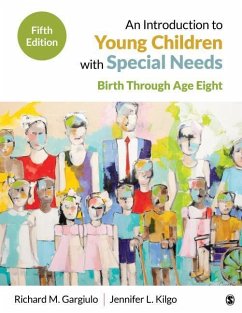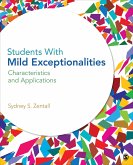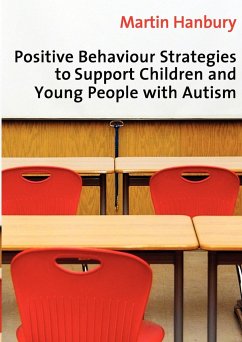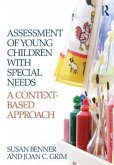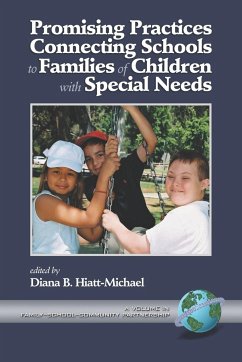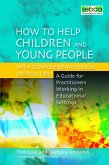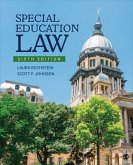Richard M Gargiulo, Jennifer L Kilgo
An Introduction to Young Children with Special Needs
Birth Through Age Eight
Schade – dieser Artikel ist leider ausverkauft. Sobald wir wissen, ob und wann der Artikel wieder verfügbar ist, informieren wir Sie an dieser Stelle.
Richard M Gargiulo, Jennifer L Kilgo
An Introduction to Young Children with Special Needs
Birth Through Age Eight
- Broschiertes Buch
- Merkliste
- Auf die Merkliste
- Bewerten Bewerten
- Teilen
- Produkt teilen
- Produkterinnerung
- Produkterinnerung
An Introduction to Young Children with Special Needs: Birth Through Age Eight is a comprehensive introduction to educational policies, programs, practices, and services for future practitioners serving young children with delays or disabilities in early intervention-early childhood special education (EI-ECSE). Thoughtfully addressing the needs of children at risk for learning or development delays or disabilities, revered authors Richard M. Gargiulo and Jennifer L. Kilgo offer evidence-based interventions and instructional techniques that provide students with a broad understanding of…mehr
Andere Kunden interessierten sich auch für
![Students with Mild Exceptionalities Students with Mild Exceptionalities]() Sydney S ZentallStudents with Mild Exceptionalities190,99 €
Sydney S ZentallStudents with Mild Exceptionalities190,99 €![Positive Behaviour Strategies to Support Children & Young People with Autism Positive Behaviour Strategies to Support Children & Young People with Autism]() Martin HanburyPositive Behaviour Strategies to Support Children & Young People with Autism53,99 €
Martin HanburyPositive Behaviour Strategies to Support Children & Young People with Autism53,99 €![Assessment of Young Children with Special Needs Assessment of Young Children with Special Needs]() Susan M. BennerAssessment of Young Children with Special Needs84,99 €
Susan M. BennerAssessment of Young Children with Special Needs84,99 €![Promising Practices Connecting Schools to Families of Children with Special Needs (PB) Promising Practices Connecting Schools to Families of Children with Special Needs (PB)]() Promising Practices Connecting Schools to Families of Children with Special Needs (PB)62,99 €
Promising Practices Connecting Schools to Families of Children with Special Needs (PB)62,99 €![How to Help Children and Young People with Complex Behavioural Difficulties How to Help Children and Young People with Complex Behavioural Difficulties]() Barbara KnowlesHow to Help Children and Young People with Complex Behavioural Difficulties39,99 €
Barbara KnowlesHow to Help Children and Young People with Complex Behavioural Difficulties39,99 €![Special Education Law Special Education Law]() Laura F RothsteinSpecial Education Law163,99 €
Laura F RothsteinSpecial Education Law163,99 €![Introduction to Contemporary Special Education Introduction to Contemporary Special Education]() Deborah SmithIntroduction to Contemporary Special Education137,99 €
Deborah SmithIntroduction to Contemporary Special Education137,99 €
An Introduction to Young Children with Special Needs: Birth Through Age Eight is a comprehensive introduction to educational policies, programs, practices, and services for future practitioners serving young children with delays or disabilities in early intervention-early childhood special education (EI-ECSE). Thoughtfully addressing the needs of children at risk for learning or development delays or disabilities, revered authors Richard M. Gargiulo and Jennifer L. Kilgo offer evidence-based interventions and instructional techniques that provide students with a broad understanding of important theoretical and philosophical foundations, including evidence-based decision making, developmentally appropriate practices, cultural responsiveness, and activity-based intervention.
Produktdetails
- Produktdetails
- Verlag: Sage Publications
- 5th edition
- Seitenzahl: 400
- Erscheinungstermin: 29. Januar 2019
- Englisch
- Abmessung: 277mm x 213mm x 15mm
- Gewicht: 1116g
- ISBN-13: 9781544322063
- ISBN-10: 1544322062
- Artikelnr.: 53486071
- Herstellerkennzeichnung
- Libri GmbH
- Europaallee 1
- 36244 Bad Hersfeld
- gpsr@libri.de
- Verlag: Sage Publications
- 5th edition
- Seitenzahl: 400
- Erscheinungstermin: 29. Januar 2019
- Englisch
- Abmessung: 277mm x 213mm x 15mm
- Gewicht: 1116g
- ISBN-13: 9781544322063
- ISBN-10: 1544322062
- Artikelnr.: 53486071
- Herstellerkennzeichnung
- Libri GmbH
- Europaallee 1
- 36244 Bad Hersfeld
- gpsr@libri.de
I have always desired to be an educator. I guess I am a rarity in that I never changed my undergraduate major or left the field of education. My undergraduate education began at Hiram Scott College in Scottsbluff, Nebraska. Three years later, I was teaching fourth graders in the Milwaukee public schools while working toward my master's degree in intellectual disability at the University of Wisconsin-Milwaukee. At the conclusion of my first year of teaching, I was asked to teach a class of young children with intellectual disability. I jumped at the opportunity and for the next three years essentially became an early childhood special educator. It was at this point in my career that I decided to earn my doctorate. I resigned my teaching position and moved to Madison, where I pursued a PhD in the areas of human learning, child development, and behavioral disabilities. Upon receiving my degree, I accepted a faculty position in the Department of Special Education at Bowling Green State University (Ohio), where for the next eight years I was a teacher educator. In 1982, I moved to Birmingham, Alabama, and joined the faculty of the University of Alabama at Birmingham (UAB), where, until my retirement, I served as a professor in the Department of Curriculum and Instruction. In November 2014, I was awarded professor emeritus status by the board of trustees of the University of Alabama system. I have enjoyed a rich and rewarding professional career spanning more than four decades. During the course of this journey, I have had the privilege of twice serving as president of the Alabama Federation, Council for Exceptional Children (CEC); serving as president of the Division of International Special Education and Services (DISES), CEC; and serving as president of the Division on Autism and Developmental Disabilities (DADD), CEC. I mostly served as the Southeast representative to the board of directors of DADD. I have lectured abroad extensively and was a Fulbright Scholar to the Czech Republic in 1991. In 2007, I was invited to serve as a Distinguished Visiting Professor at Charles University in Prague, Czech Republic.Teaching has always been my passion. In 1999, I was fortunate to receive UAB's President's Award for Excellence in Teaching. In 2007, I received the Jasper Harvey Award from the Alabama Federation of CEC in recognition of being named the outstanding special education teacher educator in the state.With a background in both educational psychology and special education, my research has appeared in a wide variety of professional journals including Child Development, Journal of Educational Research, Journal of Learning Disabilities, American Journal of Mental Deficiency, Childhood Education, Journal of Visual Impairment and Blindness, British Journal of Developmental Psychology, Journal of Special Education, Early Childhood Education Journal, International Journal of Clinical Neuropsychology, and International Journal of Special Education, among a host of others.In addition to the present text, I have authored or coauthored more than ten books, several enjoying multiple editions, ranging in topics from counseling parents of children with disabilities to child abuse, early childhood education, teaching in inclusive classrooms, and, most recently, instructional strategies for students with intellectual disability. Personal experience and unforeseen opportunities led me to a career in early intervention and early childhood special education (EI/ECSE). When I was a young child, my sibling was born with multiple medical complications and died shortly after birth. This tragic event sparked my interest in early childhood disabilities and set me on a path toward a career in EI/ECSE. While I was studying psychology as an undergraduate, Congress passed Public Law 94-142, the Education for All Handicapped Children Act, which provided services for children with developmental delays and disabilities. This legislation opened new opportunities for me and solidified my passion for improving opportunities for infants and young children with delays and disabilities, as well as their families. I have pursued this passion in higher education. Currently, I am a professor of early intervention/early childhood special education at the University of Alabama at Birmingham (UAB). I hold a BS in psychology from Auburn University; teacher certification in general early childhood education; an MA in special education and certification in administration from UAB; and a doctoral degree in EI/ECSE from the University of Alabama (Tuscaloosa). Prior to my appointment to the faculty at UAB, I taught at Virginia Commonwealth University and the University of Hawaii. As a professor at UAB, I enjoy interprofessional teaching of graduate students representing a variety of disciplines (e.g., ECSE, physical therapy, occupational therapy) who are learning to collaboratively provide team-based services to young children with delays and disabilities and their families. My involvement in EI/ECSE has extended for many years. Before becoming a higher education faculty member, I provided direct services to young children with delays and disabilities and their families in various community agencies and school settings. Also, I worked as a teacher at an EI/ECSE program at the University of Alabama, the RISE Center. My experience with young children and their families has informed my ability to teach others, as well as my interest in various scholarly activities. My involvement at the state and national/international levels in service, scholarship, and personnel preparation activities has been a highlight of my career. For example, my leadership positions have included serving as the president of the Division for Early Childhood (DEC) of the Council for Exceptional Children (CEC). Additionally, I have been a member of the editorial review board for leading national journals, served as the principal investigator of numerous federally funded grants, and delivered presentations at conferences throughout the country. My research has focused on teamwork and interprofessional education. Through a series of federally funded grants spanning more than 25 years at UAB, my work has focused on teaming and collaboration as professionals representing multiple disciplines learn to work as members of transdisciplinary teams in early intervention and early childhood special education throughout the community. Collaboration with community partners is central to the success of my career. The recognition and accolades I have been fortunate to receive have primarily highlighted my dedication to teaching and my collaborative endeavors. In 2013, I received the honor of being designated a University Professor by the UAB Board of Trustees. The criteria for this appointment includes "numerous achievements and extensive recognition in the individual's chosen professional field, and academic competence to enable her to undertake cross-departmental, cross-disciplinary activities in research and teaching and community service." I also was presented with the Sam Brown Bridge Builder Award for my collaborative efforts with multiple disciplines at UAB and within the community. In 2020, I received the Ingalls Award for Lifetime Achievement in Teaching Excellence at UAB. Being acknowledged by my students and colleagues has held significant value for me throughout my rewarding career. I aspire to have made meaningful contributions to interprofessional education within higher education and to have played a role in enhancing services for infants and young children with delays and disabilities, as well as their families.

